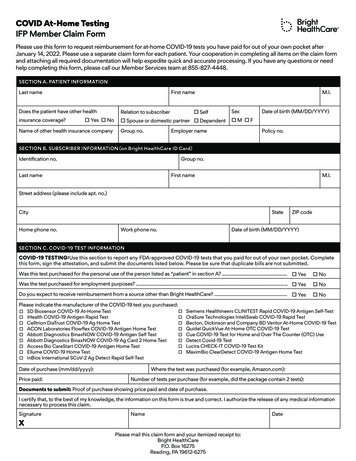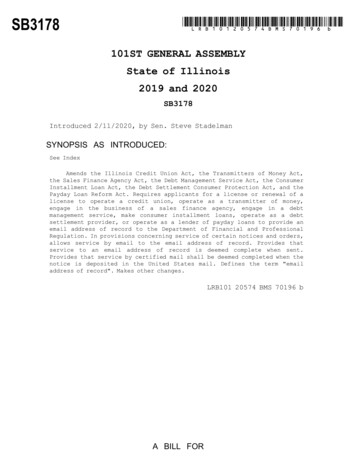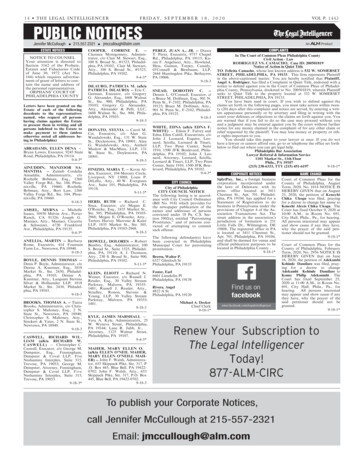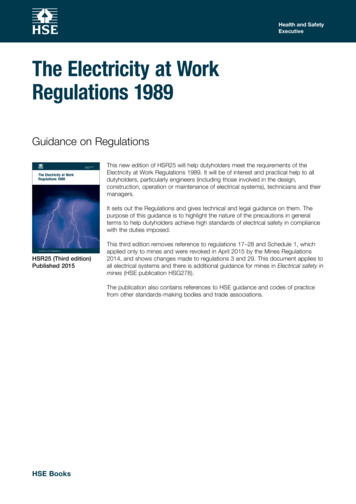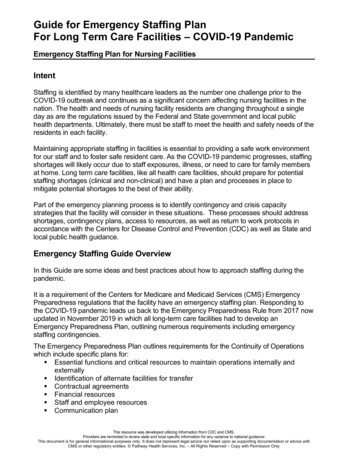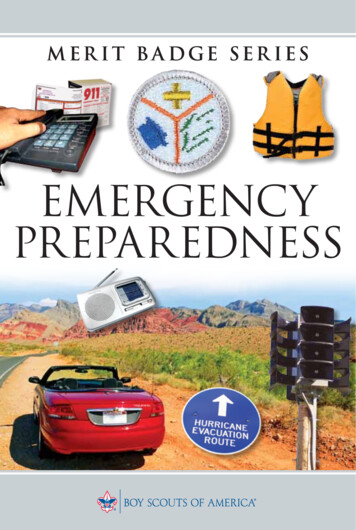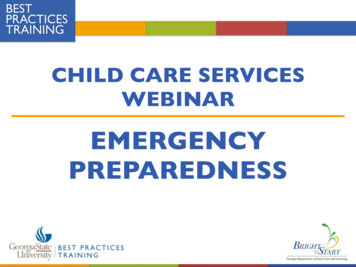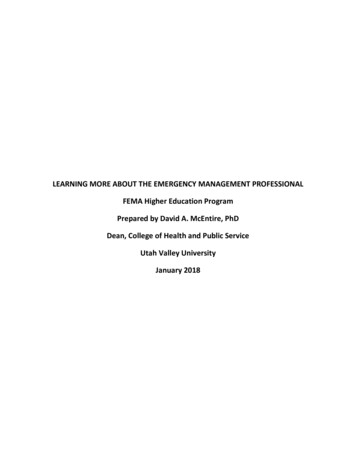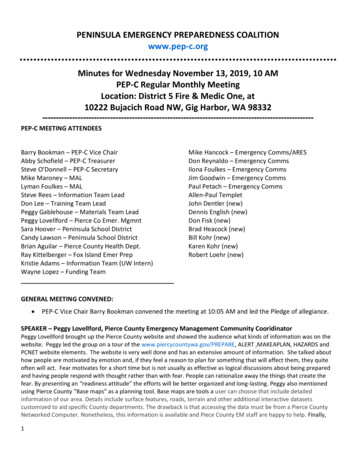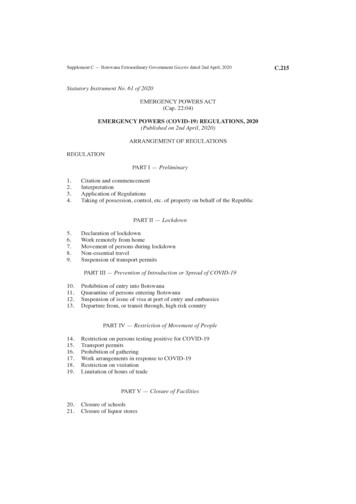
Transcription
Supplement C — Botswana Extraordinary Government Gazette dated 2nd April, 2020Statutory Instrument No. 61 of 2020EMERGENCY POWERS ACT(Cap. 22:04)EMERGENCY POWERS (COVID-19) REGULATIONS, 2020(Published on 2nd April, 2020)ARRANGEMENT OF REGULATIONSREGULATIONPART I — Preliminary1.2.3.4.Citation and commencementInterpretationApplication of RegulationsTaking of possession, control, etc. of property on behalf of the RepublicPART II — Lockdown5.6.7.8.9.Declaration of lockdownWork remotely from homeMovement of persons during lockdownNon-essential travelSuspension of transport permitsPART III — Prevention of Introduction or Spread of COVID-1910.11.12.13.Prohibition of entry into BotswanaQuarantine of persons entering BotswanaSuspension of issue of visa at port of entry and embassiesDeparture from, or transit through, high risk countryPART IV — Restriction of Movement of People14.15.16.17.18.19.Restriction on persons testing positive for COVID-19Transport permitsProhibition of gatheringWork arrangements in response to COVID-19Restriction on visitationLimitation of hours of tradePART V — Closure of Facilities20.21.Closure of schoolsClosure of liquor storesC.215
C.216PART VI — Miscellaneous ion of applicable penaltiesDesignated places of entry, exit, etc.Import of essential suppliesPricing and sale of essential suppliesStandards, specifications for hand sanitisersRestriction of essential suppliesPower to stop, detain and arrestDead bodies, conveyance, burial, etc.Payment of compensation and remunerationOffences and penaltiesRevocation of InstrumentsSCHEDULESIN RECOGNITION of the risk posed by the COVID-19 pandemic and in exercise of thepowers conferred on the President by section 3 of the Emergency Powers Act, the followingRegulations are hereby made —PART I — PreliminaryCitation andcommencementInterpretation1. These Regulations may be cited as the Emergency (COVID-19)Regulations, 2020, and shall commence on publication and shall be subject tothe affirmation by a resolution of the National Assembly.2. In these Regulations, unless the context otherwise requires —“COVID-19” means the Novel Coronavirus (2019-nCov) which is aninfectious disease caused by a virus, and declared a global pandemic bythe WHO on 11th March, 2020;“emergency services” means the Botswana Police Service, Botswana DefenceForce, Prisons Service, Fire Services, ambulance service, medicalservice and veterinary service;“essential services” means any service that is provided in the followingservices )Government printing and publishing services;immigration services;custom services;banking services;central banking services;stock exchange services;insurance services;pension administrator services;fund managers;postal services;electronic payment service providers;maintenance and hardware services;general dealer;supermarket;butchery;tuckshop services;
rement services;pest control services;chemical supply services;manufacturing services;water services;power services;emergency services;communication services;medical aid services;sanitation and refuse removals services;health services;legal practitioners;energy sector services;farming services, including crop production services;social services;private security services;petroleum services;restaurant and takeaway services;bakery;courier and delivery services;funeral parlour services;administration of justice;air traffic control services;mining services;andany essential services as may be determined by the Presidentand published by Notice in Gavernment Gazette,and any other service in the supply chain connected with the provision of theabove services;“essential service provider” includes employees of the essential services;“essential supplies” means –(a)(b)food supplies;medical equipment and supplies including sanitisers, surgicalgloves, soap, antiseptics, bleach, surgical spirit, methylatedspirit, disinfectants, baby wipes, wet wipes and surgicalmasks;(c)pharmaceutical supplies;(d)agricultural supplies;(e)maintenance and hardware supplies;(f)communication supplies;(g)air supplies;(h)rail supplies;(i)water supplies, including chemicals and equipment requiredby the water sector; and(j)mining supplies,and any other commercial supplies connected with essential services;“gathering” means any assembly, concourse or procession of more than twopersons, wholly or partially in open air or premises and shall exclude ahousehold or a group of essential service providers;
C.218Applicationof RegulationsTaking ofpossession,control, etc.of property onbehalf of theRepublic“high risk countries” means, Australia, Belgium, Canada, Chechnya, China,Denmark, United Kingdom, South Korea, France, Japan, Iran, UnitedStates of America, Germany, Italy, Netherlands, Norway, Portugal,Spain, Sweden, Switzerland, India, and includes any other countrythat may be declared as a high risk country by WHO for purposes ofCOVID-19;“law enforcement officer” means any member of the Botswana Police Service,Botswana Prison Service, Botswana Defence Force, wildlife officer orDirectorate of Intelligence Services officers;“lockdown” means a severe form of social distancing under conditions as setout in Part II;“midnight” in reference to a day, means the point of time at which that dayends;“social distancing” means any public health measure taken to reduceinteraction and contact between persons, to limit spread of diseasesthat are transmitted between persons including through contact andcoughing; and“WHO” means the World Health Organization.3. These Regulations shall apply for the duration of the emergencyproclamation and shall apply to the whole of Botswana.4. (1) For the purposes of these Regulations and in the interest of publichealth, the President may authorise, on behalf of the Republic —(a) the taking of possession or control of any property or undertaking;and(b) the acquisition of any property other than land.(2) Any possession or control of property or any arrangements made beforethe commencement of these Regulations, shall continue to be in force as ifmade under these Regulations.(3) Any person whose property is taken under this regulation shall becompensated and remunerated in terms of regulation 30.PART II — LockdownDeclaration oflockdownWork remotelyfrom homes5. (1) During the state of public emergency declared by the President underthe Emergency Proclamation, the President may declare a national lockdownfor the whole of Botswana or a lockdown in a particular location or area ofBotswana.(2) For the purpose of preventing, controlling and suppressing the spread ofCOVID-19, a lockdown is hereby declared with effect from 2nd April, 2020 atmidnight until 30th April, 2020, for the whole of Botswana.6. During the period of a lockdown —(a)all businesses and offices may only continue their businessoperations by allowing their employees to work remotely fromhome except employees designated as essential service provider;and(b)all persons employed within the public service, parastatals and anyother state owned entity, unless specifically designated as essentialservice providers, shall work remotely from home.
C.2197. (1) During the period of a lockdown every person shall remain confinedto their place of residence, inclusive of the yard space to avoid contact outsidehis household except —(a)to attend an urgent meeting of Cabinet;(b)to attend an urgent meeting of the National Assembly;(c)to attend an urgent meeting of a council;(d)to attend an urgent meeting of the National Task Force onCOVID-19;(e)if the person is an essential service provider in the discharge ofhis duties; or(f)if the person, not being an essential service provider, leaves hisplace of residence to access essential supplies as provided undersubregulation (2),and shall be required to fill out Form A or B as set out in Schedule 1.(2) Subject to subregulation (1) (e), a person may leave his place ofresidence between the hours of 0800 hours and 2000 hours to access thefollowing essential supplies at the nearest —(a)butchery;(b)funeral parlour;(c)general dealer;(d)bakery;(e)maintenance or hardware services;(f)tuckshop;(g)health facility;(h)medical aid services;(i)restaurant or takeaway;(j)supermarket;(k)fuel filling station;(l)pharmacy or chemist;(m)agricultural shop;(n)designated place for the collection of social protection packages,(o)bank; or(p)insurance company;(3) Notwithstanding subregulation (1), a person may leave his place ofresidence between the hours of 0800 hours and 2000 hours to assist the elderlyor the sick in accessing the facilities provided under subregulation ((2) (g), (h),(l) and (n).(4) For purposes of subregulation (2), a person means an individual from ahousehold, except when rendering assistance under subregulation (3).(5) A meeting of Cabinet, National Assembly, council and NationalTaskforce on COVID-19 shall at all times adhere to the social distancingrequirements issued by the Director of Health Services as published in theGovernment Gazette.(6) A trader or supplier under subregulation (2) shall —(a)ensure that all customers and staff maintain physical socialdistancing requirements issued by the Director of HealthServices;(b)determine the number of persons that may be permitted in theestablishment at any one time;Movement ofpersons duringlockdown
C.220(c)Non-essentialtravelSuspension oftransportpermitsCap. 69:03Cap. 69:01(Sub. Leg.)place any distance markers that may be required to ensure thatthe social distancing requirements issued by the Director of HealthServices are complied with.(7) The provisions of this regulation shall continue to apply after thelockdown.(8) A person who contravenes this regulation commits an offence andis liable to a fine not exceeding P5 000 or to imprisonment for a term notexceeding six months, or to both.8. A person shall not travel between villages, towns, cities and districts fornon-essential travel during a lockdown.9. (1) A permit issued in terms of —(a)section 5 (1) (b) of the Road Transport (Permits) Act for hire orreward to use a vehicle to convey any person by means of a motorvehicle;(b)section 6 (1) (e) of the Road Transport (Permits) Act to carrypassengers and baggage for hire or reward or on own account;(c)section 10 (3) of the Road Transport (Permits) Act which is ashort-term permit;(d)regulation 10 (a) of the Road Traffic Regulations for roadworthiness; and(e) regulation 11 (1), (2) and (3) of the Road Traffic Regulations forconversion of foreign licence,is suspended with effect from midnight of 2nd April, 2020.(2) Notwithstanding the provisions of subregulation (1), during thelockdown the Minister shall issue temporary permits for the purposes ofsubregulation (3).(3) The following persons shall be permitted to access public transport —(a)essential service providers;(b)persons accessing essential supplies at regulation 7 (2):Provided that public transportation shall be accessed between 1800 hoursand 2000 hours.(4) A person issued with a temporary permit under subregulation (2) shall —(a) wash their hands with clean water and soap or use hand sanitiser;(b) observe the social distancing requirements of being at least twometres apart from each other; and(c) comply with directions for the prevention of spread of COVID-19issued by the Director of Health Services as published in theGovernment Gazette.PART III — Prevention of Introduction or Spread of COVID-19Prohibition ofentry intoBotswana10. (1) Subject to subregulation (2), during the state of public emergencyno person shall enter Botswana other than a citizen or a non-citizen resident inBotswana.(2) The President may, in so far as it appears to be necessary and expedientfor the purposes of these Regulations —(a) allow entry into Botswana of a non-citizen for the provision ofessential permits or the delivery of essential supplies;(b)allow the exit from Botswana of a citizen for medical purposes;and
C.221(c)deport and exclude from Botswana a person who is a noncitizen.(3) Any person who enters Botswana in contravention of subregulation(1) commits an offence and is liable to a fine not exceeding P5 000 or toimprisonment for a term not exceeding six months, or to both.11. (1) In order to control the spread of COVID-19, a citizen or noncitizen resident in Botswana shall upon entering Botswana be subjected to theprovisions of section 80 (1) (c) and (d) of the Public Health Act.(2) A person who refuses to be subjected to the provisions of section 80(1) of the Public Health Act commits an offence and is liable to a fine notexceeding P5 000 or to a term of imprisonment not exceeding six months, orto both.12. (1) During the state of public emergency, the processing of visas at aport of entry or at any embassy shall be suspended.(2) All valid visas save for those non-citizens who are already present inBotswana are hereby revoked.(3) Subject to regulation 10 (2) (c), a person with a valid visitor’s permitwho entered Botswana before the declaration of the state of public emergencyand whose permit expires during the state of public emergency shall be deemedto have a valid visitor’s permit during the state of public emergency.13. (1) Any person who departed from a high risk country or transitedthrough a high risk country and entered Botswana on or after 11th March, 2020and did not undergo Government-monitored quarantine shall, within five daysafter coming into force of these Regulations, notify —(a) the Director of Health Services of the people who he has comeinto contact with since his arrival into Botswana and the placesvisited in Botswana at the following numbers —(i)997,(ii)3632756,(iii) 3632757, or(iv) 3632773; or(b) any law enforcement officer,and the provisions of regulation 11 (1) shall apply to such person.(2) Any person who contravenes the provisions of subregulation (1) commitsan offence and is liable to a fine not exceeding P5 000 or to imprisonment fora term not exceeding six months, or to both.Quarantine ofpersons entering BotswanaCap. 63:01Suspension ofissue of visa atport of entryand embassiesDeparturefrom, or transitthrough, highrisk countryPART IV — Restriction of Movement of People14. (1) A person who has tested positive for COVID-19 shall not —(a)be an essential service provider;(b)transport essential supplies; or(c)travel or visit any place, except a health facility under thesupervision of the Director of Health Services,unless, the person has completed his isolation or quarantine and has beencertified by a medical practitioner that it is safe for that person to leave theirplace of residence.(2) A person under subregulation (1) who —(a)is an essential service provider; or(b)transports essential supplies,Restriction onpersontesting positive forCOVID-19
C.222TransportpermitsProhibition ofgatheringWork arrangements inresponse toCOVID-19and who does not declare to his employer that he has tested positive forCOVID-19 commits an offence.15. (1) Notwithstanding the provisions of regulation 9 (1), the Minister shallissue temporary permits for the purposes of subregulation (2).(2) The following persons shall be permitted to access public transport —(a)essential service providers;(b)persons accessing essential supplies at regulation 7 (2):(3) A person issued with a temporary permit under subregulation (2) shall —(a)regularly wash his hands with clean water and soap or use handsanitiser;(b)observe the social distancing requirements of being at least twometres apart from each other; and(c)comply with directions for the prevention of spread of COVID-19issued by the Director of Health Services as published in theGovernment Gazette, and shall ensure that passenger comply withthis subregulation.(4) Regulation 22 shall apply to any renewal of a licence or permit underthe Road Traffic Act and the Road Transport (Permits) Act.(5) A driving test provided under section 39 of the Road Traffic Act andregulation 13 of the Road Traffic Regulations, except a driving test carried outfor the purpose of obtaining a driver’s licence for a freight truck, is suspendedduring the state of public emergency.(6) Section 84 of the Road Traffic Act which empowers the police toinspect, remove and detain vehicles involved in accidents shall not apply untilfurther notice.(7) Regulation 126 of the Road Traffic Regulations which restricts themovement of certain vehicles at night shall not apply to freight trucks carryingessential services during the state of public emergency.16. (1) During the state of public emergency, a gathering of more than twopersons is hereby prohibited:.Provided that this regulation shall not apply to a meeting of Cabinet,a meeting of the National Assembly, a council meeting or a meeting of theNational Taskforce on COVID-19.(2) All religious places of worship shall be closed during the state of publicemergency.(3) During the state of public emergency, the number of persons attending afuneral shall not exceed 50.(4) All persons at a funeral, irrespective of their number, shall —(a)be provided by the host with clean water and soap to wash theirhands or with hand sanitiser;(b)observe the social distancing requirements of being at least twometres apart from each other; and(c)comply with directions for the prevention of spread of COVID-19issued by the Director of Health Services as published in theGovernment Gazette.17. (1) During the state of public emergency following a lockdown, allmembers of the public service shall work as directed by the Director of PublicService Management as per any directives or circulars as may be issued forthat purpose and shall comply with directions for the prevention of spread ofCOVID-19 issued by the Director of Health Services.
C.223(2) During the state of public emergency following a lockdown, allmembers of the private sector shall arrange themselves to work in a mannerthat complies with directions for the prevention of spread of COVID-19 issuedby the Director of Health Services.(3) An employer shall ensure that employees shall —(a)wash their hands with clean water and soap or use hand sanitizer;(b)observe the social distancing requirements of being at least twometres apart from each other; and(c)comply with directions for the prevention of spread of COVID-19issued by the Director of Health Services as published in theGovernment Gazette.18. During the state of public emergency, a person other than a legalpractitioner or medical practitioner shall not visit or be permitted to visit —(a)any place of quarantine or isolation station;(b)a patient in a hospital or facility, except a responsible adult in thecase of a minor;(c)a detainee in a prison or police cell;(d)any rehabilitation centre; and(e)refugee camp or centre for illegal immigrants.19. During the state of public emergency —(a)the following shall only operate as a take-away service foressential service providers between the hours of 1000 hours and2000 hours(i)a restaurant, and(ii)a takeaway, and(b)the following shall operate between the hours of 0800 hours and2000 hours —(i)butchery,(ii)funeral parlour,(iii)general dealer,(iv)bakery,(v)maintenance and hardware services,(vi)tuckshop,(vii) health facility,(viii) medical aid services,(ix)supermarket,(x)fuel filling station,(xi)pharmacy or chemist,(xii) agricultural shop, or(xiii) designated place for the collection of social protectionpackages.Restriction onvisitationLimitation ofhours of tradePART V — Closure of Facilities20. (1) All schools shall be closed during the state of public emergency.(2) For purposes of this regulation, “school” means a pre-primary school,primary school, post primary school, driving school and tertiary institution,including a university.Closure ofschools
C.224Closure ofliquor storesCap. 43:1121. (1) A liquor licence issued in terms of the Liquor Act is herebysuspended during the state of public emergency, all liquor stores shall remainclosed and no liquor shall be sold.(2) For purposes of this regulation, “liquor” includes all traditional beers.PART VI — Miscellaneous ProvisionsSuspension ofapplicablepenaltiesDesignatedplaces of entry,exit, etc.Import ofessentialsuppliesPricing and saleof essentialsuppliesStandardsspecificationsfor handsanitisersRestriction ofessentialsupplies22. (1) Any licence, permit, identity card or authorisation issued to anyperson under any Act which expires during the duration of the state of publicemergency shall be deemed to be valid for the duration of the emergencyproclamation.(2) Subregulation (1) shall not apply to any licence, permit or authorisationwhich expired before the declaration of the state of public emergency.(3) Any penalty applicable for failure to renew any licence, permit, identitycard or authorisation is hereby suspended for the duration of the emergencyproclamation.23. (1) The places of entry, exit, landing and loading and examination ofgoods in Botswana during the state of public emergency shall be as set out inSchedule 2.(2) During the state of public emergency, the take-off and landing of aircraftsshall only be at the airports set out in Schedule 2.(3) A person who contravenes subregulation (2) commits an offence and isliable to a fine not exceeding P10 000 000 or to imprisonment for a term notexceeding ten years, or to both.24. (1) During the state of public emergency essential supplies shall beimported and supplied by licensed suppliers only.(2) Any person who contravenes the provisions of subregulation (1) commitsan offence and is liable to a fine not exceeding P100 000 or to imprisonmentfor a term not exceeding five years, or to both.25. (1) During the state of public emergency —(a)where there is an increase in the cost of procurement or productionof essential supplies, a trader shall not increase the price ofprocurement or production of essential supplies by more than theadditional cost of procurement or production of such essentialsupplies; and(b)a trader who sells essential supplies shall not sell any other goodswhich are not essential supplies.(2) A trader who contravenes the provisions of subregulation (1) commits anoffence and is liable to a fine not exceeding P100 000 or to imprisonment for aterm not exceeding five years, or to both.26. (1) Standard BOS 844:2020 is hereby declared the hand sanitiserspecification with immediate effect.(2) Any person who contravenes this regulation commits an offence andshall be liable to imprisonment for a term not exceeding three years or to a finenot exceeding P5 000, or to both.27. During the state of public emergency a trader shall, as far as practicablypossible, ensure that the supplies listed in the first column of Schedule 3 do notexceed the limits set out in the second column of Schedule 3.
C.22528. (1) Where a law enforcement officer has reasonable cause to believe thata person is in violation of these Regulations, he may stop, detain, question andarrest such person and confiscate any vehicle being used by that person, if heconsiders it necessary so to do.(2) Any person who assaults, obstructs, hinders or resists or uses anythreatening or abusive language or aids or incites any other person to assault,obstruct, hinder or resist any law enforcement officer in the execution of hisduty under this regulation, commits an offence.29. Where a person dies of COVID-19, the provisions of section 5 of theConveyance of Dead Bodies Act as read with the Public Health Act shall apply.30. (1) Subject to the provisions of paragraph 8 (e) of the Public FinanceManagement (COVID-19 Pandemic (Corona Virus) Relief Fund) Order, 2020,the President may authorise the payment of compensation and remuneration toany person affected by these Regulations.(2) Any arrangement entered into before the coming into effect of theseRegulations shall be deemed to have been made under these Regulations.(3) Any person who relays any information to the public about COVID-19from a source other than the Director of Health Services, and the WHO commitsan offence and is liable to a fine not exceeding P100 000 or to imprisonmentfor a term not exceeding five years, or to both.31. (1) A person who contravenes a provision of these Regulations in whicha penalty is not provided for commits an offence and is liable to a fine notexceeding P100 000 or to imprisonment for a term not exceeding five years,or to both.(2) A person who intentionally exposes another person to COVID-19commits an offence and is liable to a fine not exceeding P100 000 or toimprisonment for a term not exceeding five years, or to both.(3) A person who publishes any statement, through any medium, includingsocial media, with the intention to deceive any other person about —(a)COVID-19;(b)COVID-19 infection status of any person; or(c)any measure taken by the Government to address COVID-19,commits an offence and is liable to a fine not exceeding P100 000 or toimprisonment for a term not exceeding five years, or to both.(4) Any person who intentionally misrepresents that he or any other personis infected with COVID-19 commits an offence and is liable to a fine notexceeding P100 000 or to imprisonment for a term not exceeding five years,or to both.32. The Instruments specified in Schedule 4 are hereby revoked.Power to stop,detain andarrestDead bodies,conveyance,burial etc.Cap. 65:01Paymentofcompensationand remuneration S.I. No. 38of 2020Offences andpenaltiesRevocation ofInstruments
C.226
C.227Republic of BotswanaFORM B(reg. 7 (1))CONFIRMATION OF EMPLOYMENT IN ESSENTIAL SERVICES(Name of the employer/company)Company Registration Number (where applicable):conducts the business ofunder the name (where applicable) andis an essential business as designated by the Emergency Powers (Covid-19) Regulations, 2020, whichcompany is required to continue its operations during the state of public emergency.The employee, whose details are set out below, fulfills an essential function, and is required to travelto and from work during the state of public emergency.EMPLOYEE’S DETAILS:SurnameFull nameIdentity numberContact detailsCell NumberTel. No. (W)Tel. No. (H) E-mail addressThe Company confirms that the information set out above is true and correct.Signed at . on this . day of ., 2020.Name and Signature of Head of The Company/EntityOfficial Stamp of the Company:NB: The person in possession of this Form shall have her/his Identity Document / Passport in her/his possession and shallpresent it to any law enforcement officer upon request.
C.228SCHEDULE 3Essential Supplies(regulation 27)Essential SuppliesQuantities per person per transaction1. Antiseptics2 litres3. Bleach1 litre2. Baby wipes4. Disinfectants5. Face masks6. Methylated and surgical spirit7. Sanitisers8. Soap9. Surgical gloves10. Wet wipes3 packets1 litre30 masks1 litre1 litre3 bars30 pairs1 packet
C.229SCHEDULE 4(reg. 32)Statutory InstrumentRevocation1. Immigration Act, ImmigrationS. I No. 34 of 2020 is hereby revoked2. Public Health Act, Public HealthS. I No. 36 of 2020 is hereby revoked(Points of Entry) Order, 2020(Prevention of Introduction of Covid-19into Botswana), Order, 20203. Public Health Act, Public Health(Prohibition of entry into Botswana)Order, 20204. Road Transport Permits Act, RoadTransport (Permits) (Suspension ofPermits) Regulations, 2020S.I No. 37 of 2020 is hereby revokedS.I No. 45 of 2020 is hereby revoked5. (a) Education Act, Education(Closure of schools) Notice(b) Education Act, Education (Closureof tertiary schools)(a)6. Liquor Act, Liquor (Amendment)Regulations, 2020S.I No. 42 of 2020 is hereby revoked8. Civil Aviation Act (Air Routes andAlways) OrderSI No. 58 of 2020 is hereby revoked(b)Government Notice No. 130 of2020 is hereby revokedGovernment Notice No. 131 of2020 is hereby revoked7. Shops and Restaurant Hours Act, Shops S.I. No. 33 of 2020 is hereby revokedand Restaurant Hours ( R e s t a u r a n tHours) Regulations, 20209. Customs Act (Designated Places of Government Notice No. 146 of 2020 isEntry, Exit and Landing, Loading and hereby revokedExamination of Goods in Botswana)MADE this 2nd day of April, 2020.DR. MOKGWEETSI ERIC KEABETSWE MASISI,PRESIDENT
4. Taking of possession, control, etc. of property on behalf of the Republic PART II — Lockdown 5. Declaration of lockdown 6. Work remotely from home 7. Movement of persons during lockdown 8. Non-essential travel 9. Suspension of transport permits PART III — Prevention of Introduction or Spread of COVID-19 10. Prohibition of entry into .
